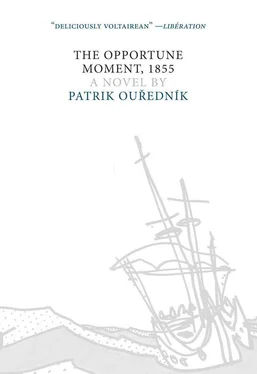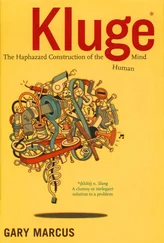Patrik Ouredník - The Opportune Moment, 1855
Здесь есть возможность читать онлайн «Patrik Ouredník - The Opportune Moment, 1855» весь текст электронной книги совершенно бесплатно (целиком полную версию без сокращений). В некоторых случаях можно слушать аудио, скачать через торрент в формате fb2 и присутствует краткое содержание. Год выпуска: 2011, Издательство: Dalkey Archive Press, Жанр: Современная проза, на английском языке. Описание произведения, (предисловие) а так же отзывы посетителей доступны на портале библиотеки ЛибКат.
- Название:The Opportune Moment, 1855
- Автор:
- Издательство:Dalkey Archive Press
- Жанр:
- Год:2011
- ISBN:нет данных
- Рейтинг книги:3 / 5. Голосов: 1
-
Избранное:Добавить в избранное
- Отзывы:
-
Ваша оценка:
- 60
- 1
- 2
- 3
- 4
- 5
The Opportune Moment, 1855: краткое содержание, описание и аннотация
Предлагаем к чтению аннотацию, описание, краткое содержание или предисловие (зависит от того, что написал сам автор книги «The Opportune Moment, 1855»). Если вы не нашли необходимую информацию о книге — напишите в комментариях, мы постараемся отыскать её.
, opens with an Italian anarchist’s missive to his noble former mistress, an impassioned rejection of all of Europe’s latest and greatest advancements, from the Enlightenment to social reform to communist revolution. We then leap back in time half a century to the alternately somber and hilarious shipboard diary of a common Italian everyman sailing to Brazil with a motley, multinational band of idealists, to build a new society. A pitiless portrait of the often unbridgeable gap between theory and practice,
is another uproarious and unsettling attack on convention by one of literature’s great provocateurs.
The Opportune Moment, 1855 — читать онлайн бесплатно полную книгу (весь текст) целиком
Ниже представлен текст книги, разбитый по страницам. Система сохранения места последней прочитанной страницы, позволяет с удобством читать онлайн бесплатно книгу «The Opportune Moment, 1855», без необходимости каждый раз заново искать на чём Вы остановились. Поставьте закладку, и сможете в любой момент перейти на страницу, на которой закончили чтение.
Интервал:
Закладка:
But if every opinion is equally valid, how do you decide? Even for the idea that it’s the majority who decides, there had to be someone, some scholar or philosopher, who came to that conclusion, and whoever came to that conclusion first was at that moment the only one who thought so. And I’ve noticed another thing, too: people who think they’re free never agree on anything, while people who don’t, almost always agree on everything.
And how can I tell whether I’m free? If I refuse to be conscripted into the army and kill people who’ve done nothing to me, that still doesn’t mean I’m free. Poor people have no reason to kill other poor people, that stands to reason, it even says so in the Bible. But Decio says that religion is the very thing that laid the foundations of the unfreedom which people live in today. He also says that it will be a long time before people cease to believe in religion, and that there are only a handful of people today who don’t believe in God. But that would mean most people, or at least most unfree people, are wrong. But how can a person say he’s free if he can’t persuade somebody else that he could be free as well?
March 28th
Yes, one morning we discovered that people were biting and eating and hating one another, and they had been all along. Let us not be people, we said to ourselves, let us be trees, let us be the shadow of branches, let us be worms. Let us be naked, let us found an empire of the naked, let us be transparent and without fear.
March 29th
We dropped anchor in view of the port after noon. Tomorrow we set foot on Brazilian soil. Paolo wrote a song called “Brazil.” We will never return to Europe again. The sea here is brighter than in Italy.
March 30th
The landing took place amid terrible confusion. To begin with, people wanted the crates of tools they had brought with them out of the storage, but the first officer turned them away, saying that was what the Negroes were for. Then, when we stepped on shore, the Brazilian police stopped us, divided us into two groups, men in one and women and children in the other, confiscated our things, and took us into a plankboard hangar where we all had to strip naked and give them the clothes we had on. We tread in place there naked as worms for three or four hours before they returned them. They stank of disinfectant, and each piece of clothing had a round blue stamp on it saying Controle higiênico, porte Rio de Janeiro. They did the same thing with the clothes we had in our bags. My telescope was stolen. For the next two nights we’re going to sleep at the Ilha das Flores inn; the French, the Austrians, and a group of Germans at the Hospedaria dos Imigrantes; and the rest of the Germans in the convent. The coast is thick with peddlers and porters shouting in Portuguese and French: Hotel Imperial! Cleanest sheets in Rio! Pipes! Tobacco! Onions! Castor oil! Brazil has four million citizens and two millon Negro slaves. Nobody knows how many Indians there are. The day after tomorrow we will be transported by boat to Paranaguá, where we will transfer to a train to Curitiba. There we will supposedly get official permission to settle in the district. It’s a pity about the telescope, I could have used it to observe the landscape and the animals. The trip from Curitiba is less than a hundred kilometers, which we should be able to cover by stagecoach in three days.
March 31st
Aniceto read us a letter that his cousin sent him for New Year’s from the Fraternitas in Rio. It said: “Free settlement Fraternitas January 2nd. Everything is coming along beautifully. The water is outstanding. We haven’t come across any wild animals yet, except for a monkey, which a hunter friend of mine shot. To eat we have birds, rice, beans, and polenta. We have to buy bread, but as soon as we have a moment free, we’re going to build an oven.”
Zeffirino organized a march through the city, with about seventy people in it, men, women, and children, marching in columns of three with tools on their shoulders. They marched down the main street all the way to the emperor’s palace, singing songs about labor. In front of the palace Zeffirino delivered an impassioned speech in which he said the settlers were freedom lovers who had escaped the prison of civilization in order to return dignity to human labor and install a government of liberation of man in Brazil. Afterwards, at the inn, he passed around a copy of the speech. Decio made some caustic remarks, asking what a government of liberation of man was and whether Zeffirino intended to install it himself.
I asked Giacomo what he thought about freedom and how soon it could be installed. He said he thought it could be installed once science had revealed the laws of nature. Once we knew the laws of nature, there would be no need for others, which are always in conflict with nature’s because they don’t derive from the true needs of man. Then, he said, the problem of freedom would be solved. No one could claim any more that hierarchy, political administration, or leadership were necessary for life in society. All those things are despotic, being forced on men by other men and not by nature. Man submits to natural laws and that’s all there is to it.
April 1st
Yesterday (evening) in the Hospedaria dos Imigrantes was the last meeting of our settler’s group. The Egalitarians submitted a list of those who wish to continue the journey, but some people announced that they had changed their minds and asked for their money back.
OCTOBER 1855
October 15th. I stopped keeping a journal when we arrived in Brazil, even though originally I had planned to continue, but Giacomo Zerla persuaded me to take it up again; he said one day it would be an important testament. This is our sixth month in the settlement now, but the truth is I don’t know where to begin. I’m not sure that today is October 15th. October 15th my mother was born. Now that we’ve reached our destination, people are testy and argue more than they did on the ship. I wrote her a letter, when I get to Guaragi I’ll send it. She was born in Casalvieri, not far from Rome. Or I’ll tell someone. There is a flagpole in the courtyard flying a red-and-black flag. In the end our departure from Rio was delayed for two days. The evening before that was the last meeting of our group, the Egalitarians submitted a list of those who wished to continue the journey, but some of the settlers announced that they had changed their minds and asked for their money back from the shared treasury. Along the way Decio also managed to get into an argument with Gorand, who said that we would need to elect a provisional leader for the settlement or at least a head manager. The courtyard is what we call the space between the buildings where the road widens out. There are thirty-eight buildings in the settlement, each one with two or three rooms, divided by plankboard walls, but without doors. The buildings are made of logs, with slanted roofs covered with branches. Instead of windows we have sliding shutters that only open halfway, and when it’s windy they slam against the wall and make a racket. There’s also a Common House, a workshop, a tannery, and a school. Some 170 settlers live here, only fifty-eight from our group came in the end, most stayed in Rio, saying they still needed to give it some thought, some settled in Curitiba or Paranaguá. To which Decio said that he believed in freedom and spontaneous will and that communists didn’t know s — about spontaneous will. Gorand said that spontaneous will had to be channeled to result in something rational. And that no revolution could do without rational leadership. To which Decio said that that was the kind of thinking he had fled Europe to escape. Gorand replied that that was his problem, no one was stopping him from going back. And Decio screamed You imbecile! and Gorand screamed You anarchist clod! and Decio screamed Despot! Donkey turd! Cow scrotum! and Gorand screamed Political dwarf! Cripple! Individualist! Originally there was also a plan for a small printing press, to be used to put out a newsletter, but there isn’t even money for liquor and tools, never mind a printing press. When we were still in Rio, Zeffirino wrote a long introduction for the first issue, stitched it into a notebook, and circulated it among the settlers for a while, and asked that it be read in school. “At this time of year, when life in the country is bursting with green, when singing and laughter sound from every corner, when the soil is coated with the first pledges of harvest, when the pupa bursts and the butterfly doesn’t know where to leap first, here, in mother nature’s womb, surrounded by an inhuman world of industry and capital, where people starve and weep, here, in this place and at this instant, begins another world, a world of freedom and prosperity.” Then there was something about fish in clear stream waters and how yesterday marked the grand opening of the new printing press, and that this was the first introduction to the first issue, still smelling of printer’s ink. When we first arrived, some of the local inhabitants treated us kindly, but some didn’t even give us a proper greeting. The ones who gave us the cold shoulder are opposed to any more people coming to the settlement. They say that Older Brother knows about all our problems and still he continues to round up settlers. They say that it’s because for every immigrant who comes here, he gets money from the Brazilian government. Some of the older settlers, most of whom come from the vicinity of Parma and used to work in agriculture, claim that our group is too large and not enough of us are familiar with agricultural work, they say what good does a locksmith or bricklayer do us and what use are workers who have never so much as smelled dirt in their lives and the second it begins to rain complain of pain in their joints. Also they say we didn’t bring enough tools or women and we interfere in everything and constantly make suggestions. I teach school half the day and in the afternoon work in the workshops. The school stands off to the side, 300 or 400 meters from the courtyard. There are twenty-five pupils, aged five to twelve. Classes are taught in French even though most of the settlers are Italians. I teach them to read and write and do arithmetic. Germaine Minne teaches geography, her husband died before we arrived, he taught political history. Of the first group of colonists that settled here two and a half years ago, half are left, about fifteen people. They issued new regulations and banned alcohol and tobacco, because alcohol is the scourge of the working man and tobacco a vice that diminishes the work drive and causes fires. Fires have broken out in the settlement twice now, once when lightning hit the granary, and once from someone smoking a pipe. Most of the people who left stayed in America, but two families supposedly returned to Italy. The others, most of them German, left for another free settlement one and a half days’ travel from here, called Trautes Heim. To the west lies still another, a more religious one, called Communia. They sent us a delegation to complain that our people were hunting on their land and spreading bad habits. No one observes the smoking ban and there’s plenty of tobacco, the Indians bring it in to us in exchange for all sorts of things, buttons, toys, shirts; but with alcohol it’s harder, because that has to be bought in the city and the money is shared. The Indians don’t smoke or sniff tobacco, they grind it up and put it on their gums and suck the juice. The delegation from Communia was dressed all in black, they had clean clothes and asked to speak to the settlement’s board of directors, but Luigi told them we were anarchists and everyone was the board. Also three Brazilian constables came to the settlement. They said that in February the Brazilian police detained a group of former settlers who were ready to confess to theft and robbery in Paranapiacaba district. A search of their homes turned up stolen cotton, furniture, bottles of wine, and so on. The police arrested six men and two women, but the bandits’ leader, Arnaldo Socco, managed to escape. The police warned us that if Socco sought refuge in the settlement, it was our responsibility to notify the officials immediately. Otherwise we would all be accomplices. Luigi says that based on the timing of ships from Europe to Rio de Janeiro, we soon should be getting more friends, both male and female. Especially female, he says. The older settlers said there’s supposedly another settlement even farther west, founded by vegetarians who came here from Kansas. Vegetarians are people who don’t eat meat. Mr. Crisson said that that flew in the face of medical science, which, on the contrary, recommends eating lots of meat. We also have one former lay brother in the settlement, his name is Marco, but for a long time we weren’t aware of it, since our settlement is free and against all forms of religion. Most of the Egalitarians left the settlement after five or six weeks, only the Allegret brothers have stayed. Jean is having relations with Elisabetta, but she said she would also sleep with me, but first she had to get used to it. Mr. Crisson also finally left. He intended to settle in California, where supposedly a lot of Frenchmen live. The consumption of meat builds fortitude and strength, and the industriousness of several nations — the Americans, the French, the Dutch, and the English — derives from the frequent eating of meat. October is one of the worst months here, people suffer from fevers. There is also a shelf in the Common House with the word Library written above it in chalk. The books on the shelf are assorted, most of them are French, The New Heloise by Jean-Jacques Rousseau, the Declaration of the Rights of Man and of the Citizen , Etienne Cabet’s Voyage to Icaria in two parts, The Year 2440 by Sébastien Mercier, a bound volume of the weekly Under Cover , a novel called I Have Loved and Been Loved (no author), some agricultural guides, and so on. Three or four books are in German, and there is one in Italian, Anarchists: The Perspective of a Mental Doctor by Dr. Cesar Lombardi. Originally Giacomo put his three-volume dictionary in the library, but after one of the volumes went missing, he took back the remaining two. The communists hold meetings and bicker about what should be done. Elisabetta and I still talk about a new life, but it’s different than it was on the ship. Sometimes she strokes my cheek, but when I try to touch her breasts or in between her legs, she says: No, Bruno, not yet. She doesn’t say when, only “not yet.” I think that free love is useless unless it’s put into practice. Decio sees the main problem in the fact that the settlement has far more men than women and that most of the women suffer from old prejudices and reject polyandry. The married women selfishly stick to their husbands and families and only rarely are they willing to get together with anyone else. On the other hand, those who are single have two or three partners at most, and instead of devoting themselves to them equally, they play the coquette, inciting jealousy. Also the men who have steady partners only reluctantly loan them to others, and despite not having the courage to object to anything publicly, afterwards they snap at them at home. Decio said that he had given the matter some thought and we ought to try inviting some Indian women into the tannery, but after two or three weeks they picked up and went back to their people, and when Umberto ran after them, they threw rocks at him. Carlo drowned bringing our two horses to the river. Some say that he was drunk, but others don’t believe it and say it was murder too. Various proposals were submitted — call in the constables or hire the Indians, so they could guard our settlement against intruders — but no one knows with certainty who the intruders are and whether there even are any, and turning to the constables would be in conflict with the ideals of our settlement. In the end it was decided to purchase new, more modern muskets. There are also some Germans from Trautes Heim working on the road and Erasmo says that they were the ones who killed his brother, there’s no trusting Germans. The Germans from our expedition, who left us, took tools with them which weren’t theirs. Three families and twenty more settlers, almost thirty people, are planning to leave. Jean-Loup wants to go to São Paulo and open a shop selling sailor’s goods, just as soon as he rounds up the money. Domenico wants to set up a sawmill in Curitiba. Decio says he’s going to leave the settlement too, though he doesn’t know where to. Puig Mayol walked away from the settlement after cracking open the safe and stealing 500 réis, almost half our money. Gorand proposed establishing a settlement guard, to be governed by a duly and freely elected Council. One of the older settlers, Benito, said in reply that there had already been a Council elected a long time ago, but no one would listen to it. Gorand said, Exactly, if they had a settlement guard, then people would pay more attention to them, because most of the settlers were honest, but not all of them. And honesty isn’t an empty word and it alone makes possible firm relationships between people, since then people know what they can expect from others. Desiderio Mezzi, who everyone calls Desimezzi, said that religion had tried something similar, issuing all sorts of precepts and prohibitions, but honest people can do without religion. Marco said nothing to that, but one of the Frenchmen said that honesty was a result of faith in God, not faith in man, and that first there was religion and only after that honesty, because for people to be honest, they have to be afraid. Desimezzi said he didn’t agree and it was the other way around, and for that matter people are afraid of all sorts of things. Decio declared that the main thing people should be afraid of is their own stupidity. And Gorand said, Can anyone here be sure that our people weren’t killed by the holy rollers from Communia? It wasn’t the Indians, they would have run them through with spears or cracked open their heads with a rock, but they wouldn’t have cut their throats and crossed their arms on their chests. The crossed arms speak to a certain level of civilization. Benito said that there had been conflicts with Communia from the very beginning, and Cattina said that she, on the other hand, didn’t trust vegetarians, because anyone who didn’t eat meat must be out of their minds. Just one little piece of freshly grilled meat and it’s like your stomach is in heaven.
Читать дальшеИнтервал:
Закладка:
Похожие книги на «The Opportune Moment, 1855»
Представляем Вашему вниманию похожие книги на «The Opportune Moment, 1855» списком для выбора. Мы отобрали схожую по названию и смыслу литературу в надежде предоставить читателям больше вариантов отыскать новые, интересные, ещё непрочитанные произведения.
Обсуждение, отзывы о книге «The Opportune Moment, 1855» и просто собственные мнения читателей. Оставьте ваши комментарии, напишите, что Вы думаете о произведении, его смысле или главных героях. Укажите что конкретно понравилось, а что нет, и почему Вы так считаете.












